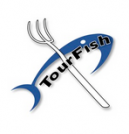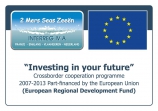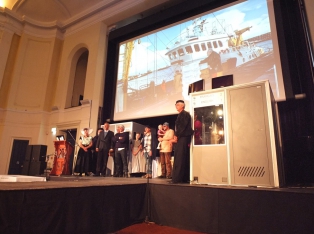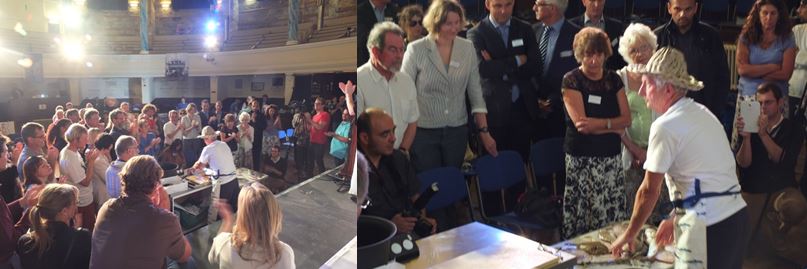Food Fisheries and Tourism: New opportunities for sustainable development


The Tourfish conference took place on Monday 23rd and Tuesday 24th of June 2014 in Hastings. The event included demonstrations, exhibitions and interactive conference sessions. The event focused on how agro-food, fisheries and tourism can work together to deliver new opportunities for sustainable development along the coast and in the towns and countryside of the 2 Seas area.
The first day of the conference started with activities on the stade hall, including an indoor and outdoor Photography exhibtion, chef demonstrations, a guided tour of the working fishing beach and the stade, … The opening session of the conference in St. Mary in the Castle included a welcome to Hastings speech, an introduction to TourFish, a cluster programme of the GIFS project and Fish&Chips project. Followed by an overview of the GIFS and Fish&Chips project.
Dr Harold Goodwin from the International Centre for Responsible Tourism and Manchester Metropolitan University gave a keynote speech about “Responsible Tourism, Sense of Place and Local Economic Development”. In his speech he raised the important question “Does fishing use tourism, does tourism use fishing?”.
The Vlaams Huis voor de Voeding (Flanders House of Food) led a thematic session about “Boosting your regional identity: Discover how regional branding can stimulate regional development, entrepreneurship and innovation”. In this session the work of Flanders House of Food was introduced.
The thematic session ended with a public voting in which the public was asked to give their satisfaction about the way their region is branded. In general the public was not that satisfied. In order to have good branding, a triple helix of stakeholders: industry, government and research needs to be involved which is often not the case.

The second thematic session “The Taste of Place: A curious journey to the province of Zeeland in the Netherlands” was led by the Municipality of Middelburg with Dr Gerard van Keken. Place branding is more than just a brand, it deals with culture, distinctiveness, sense of place and history. During his session Gerard van Keken included an interactive quiz and finished with an Arnemuiden catwalk.
The second day of the conference started with “Fish, Food and Festivals: Responsible tourism and fishing-led community regeneration” led by Sidmouth Trawlers, Hastings Fishermen's Protection Society and University of Brighton. During this session 5 lessons learnt of two very different fishing communties were presented: heritage, identity, fishers and community knowledge, community ownership and connectivity.
The Bagwell’s fisher family was invited on stage for an interview. Stan Bagwell’s wife, his daughter and grandson were interviewed about their lives as fisher family. The daughter works in the family fish shop and her son, Mark is a fisherman who works 6 days in a week with days from 2:30 am till 10 pm.
Also in this session, Yasmin Ornsby from the Hastings Fishermen’s Protection Society introduced the Classroom on the Coast and Joy Collins talked about her experience as Hastings FLAG manager.
The next thematic session “Education, fish and food: Raising awareness of food, sustainability and responsible tourism” was led by University of Brighton, Hastings Fishermen's Protection Society, Flanders House of Food and Nausicaa. During this session innovative alternative educational models were introduced together with a demonstration of the Classroom on the coast.
In this session, a fish filleting demonstration was held by Tush from “Tush and Pat's Famous Fishermen’s Rolls”.

Clare Devereux, Policy Director of Food Matters held a keynote speech about “Sustainable Food - Making the Connection from Spade to Spoon”.
“From Catch to Plate & Plough to Plate: Sustainable seafood and local land products for today and tomorrow” was the final thematic session led by Nausicaa and Taste South East. In this session, the Mr Goodfish programe was introduced by Nausicaa together with the Local catch programme introduced by Taste South East.
The day ended with a concluding session led by Tim Acott and Julie Urquhart from the University of Greenwich.
More information about Tourfish: http://www2.gre.ac.uk/about/schools/gmi/about/events/lectures/tourfish